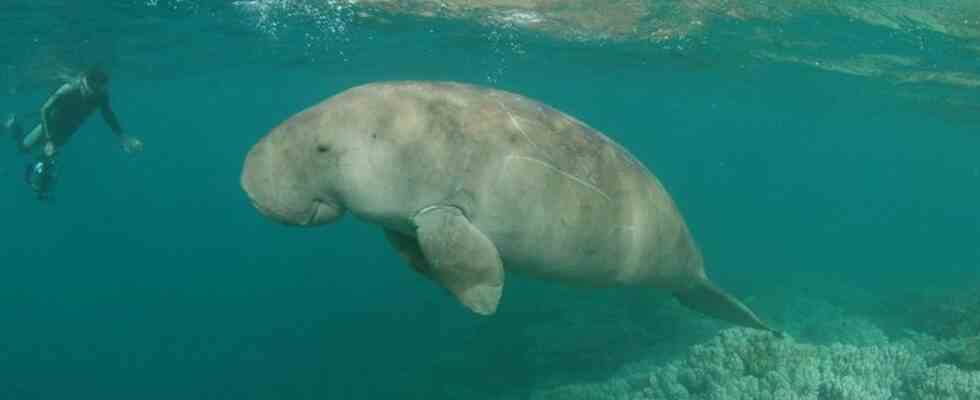species extinction
Dugong cows partly threatened with extinction
A dugong swims in the lagoons off New Caledonia. photo
© Christian Grondin/Xinhua/dpa
They are said to have provided the template for the myth of the mermaid. Off the coast of East Africa, however, the dugong manatees may soon be gone forever.
Dugong sea cows are said to have once inspired the myth of the mermaid – now these sea animals with the distinctive tail fin are threatened with extinction off East Africa. There are only 250 adult specimens left there, the World Conservation Union (IUCN), which leads the Red List of Threatened Species, reported on Friday. The population around New Caledonia, with fewer than 900 adults, has been classified as critically endangered.
The biggest threats include fishing nets, marine oil and gas activities, marine pollution and the destruction of offshore seaweed on which dugongs feed. This is due, among other things, to sewage that gets into the sea and pollution from the mining of nickel. The IUCN calls for improved fisheries regulation, alternative income opportunities for coastal residents and protected zones.
Thousands of animal and plant species threatened
The Red List, which has been in existence since 1964, contains more than 42,000 endangered animal and plant species. The IUCN classifies studied species into eight categories, ranging from “data insufficient” to “extinct”. “Endangered” is level 5. “Critically Endangered” is level 6.
The IUCN has had abalone examined for the first time and classified 20 of the known 54 species as threatened. These are auricle-like snails that are considered a delicacy in many places. Problems include poachers, diseases and pollution as well as the consequences of climate change. Due to marine heat waves, 99 percent of the Haliotis roei species died off in north-west Australia. “Without healthy seas, we can neither have a healthy planet nor a healthy climate,” said Anne Hanschke, species protection expert at WWF Germany. “In order not to tear even more species into the abyss, a change of direction in politics, the economy and financial systems towards more sustainability is now needed.”
IUCN presented the new list at the 15th World Summit on Nature (also COP15) in Montréal, Canada, where an agreement to protect biodiversity on earth is to be decided. “We simply cannot afford to fail,” said IUCN Director-General Bruno Oberle. Hanschke demanded that 30 percent of the sea be protected by 2030.
The explorer Columbus reported mermaids in 1493. Today it is assumed that it was dugongs that can emerge vertically from the sea. They were not half as beautiful as described, but had “masculine features” in their faces, quoted the magazine “National Geographic” in an article from Columbus’ notes.

